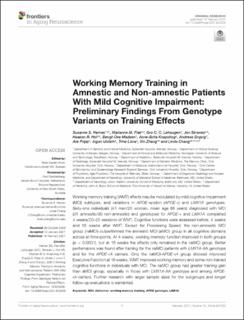Working Memory Training in Amnestic and Non-amnestic Patients With Mild Cognitive Impairment: Preliminary Findings From Genotype Variants on Training Effects
Hernes, Susanne Miriam Sørensen; Flak, Marianne Møretrø; Løhaugen, Gro Christine Christensen; Skranes, Jon Sverre; Hol, Haakon Ramsland; Madsen, Bengt-Ove; Knapskog, Anne Brita; Engvig, Andreas; Pripp, Are Hugo; Ulstein, Ingun; Lona, Trine Eli.b.; Zhang, Xin; Chang, Linda
Journal article, Peer reviewed
Published version

Åpne
Permanent lenke
https://hdl.handle.net/11250/2991402Utgivelsesdato
2021Metadata
Vis full innførselSamlinger
- Department of Clinical Science [2395]
- Registrations from Cristin [10402]
Sammendrag
Working memory training (WMT) effects may be modulated by mild cognitive impairment (MCI) subtypes, and variations in APOE-epsilon (APOE-ε) and LMX1A genotypes. Sixty-one individuals (41 men/20 women, mean age 66 years) diagnosed with MCI (31 amnestic/30 non-amnestic) and genotyped for APOE-ε and LMX1A completed 4 weeks/20–25 sessions of WMT. Cognitive functions were assessed before, 4 weeks and 16 weeks after WMT. Except for Processing Speed, the non-amnestic MCI group (naMCI) outperformed the amnestic MCI (aMCI) group in all cognitive domains across all time-points. At 4 weeks, working memory function improved in both groups (p < 0.0001), but at 16 weeks the effects only remained in the naMCI group. Better performance was found after training for the naMCI patients with LMX1A-AA genotype and for the APOE-ε4 carriers. Only the naMCI-APOE-ε4 group showed improved Executive Function at 16 weeks. WMT improved working memory and some non-trained cognitive functions in individuals with MCI. The naMCI group had greater training gain than aMCI group, especially in those with LMX1A-AA genotype and among APOE-ε4-carriers. Further research with larger sample sizes for the subgroups and longer follow-up evaluations is warranted.
